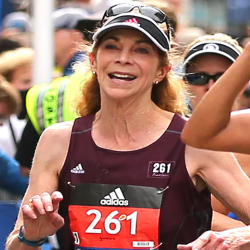
Kathrine Switzer
| Date of Birth | : | 05 Jan, 1947 |
| Place of Birth | : | Amberg, Germany |
| Profession | : | Marathon Runner, Author |
| Nationality | : | American |
| Social Profiles | : |
Facebook
Twitter
Instagram
|
Kathrine Virginia Switzer is an American marathon runner, author, and television commentator. In the year 1967 she became the first woman to run the Boston Marathon as an officially registered competitor.
Life and career
Switzer was born in Amberg, American-occupied zone of Germany, the daughter of a major in the United States Army. Her family returned to the United States in 1949. She graduated from George C. Marshall High School in Fairfax County, Virginia, then attended Lynchburg College. She transferred to Syracuse University in 1967, where she studied journalism and English literature. She earned a bachelor's degree there in 1968 and a master's degree in 1972.
1967 training
After transferring from Lynchburg to Syracuse, Switzer sought permission to train with the men's cross-country running program. Permission was granted, and cross-country assistant coach Arnie Briggs began training with her. Briggs insisted a marathon was too far for a "fragile woman" to run, but he conceded to Switzer: "If any woman could do it, you could, but you would have to prove it to me. If you ran the distance in practice, I’d be the first to take you to Boston." By the winter of 1967, Switzer was training for the upcoming Boston Marathon, tackling courses in Syracuse and on the roads between Syracuse and Cazenovia, New York, 20 miles away.
1967 Boston Marathon
The rule book for the Boston Marathon made no mention of gender. The AAU, which governed the Marathon, declared that women could not compete in AAU-sanctioned races over a mile and a half.
This exclusion of women from a premier athletic event was already drawing high-profile challenges. In 1966, Bobbi Gibb had tried to enter the race officially but had been rejected by BAA Director Will Cloney who claimed women were physiologically incapable of running 26 miles. Gibb completed the 1966 race ahead of two-thirds of the runners with a time of 3:21:40, having entered the course near the starting pen in the middle of the pack. But Gibb was not an official entrant.
Personal life
In 1968, Switzer married Tom Miller, the man who had put an end to Semple's attack in 1967. They divorced in 1973. Switzer subsequently married and divorced public relations executive Philip Schaub. She then married British-born New Zealand runner and author Roger Robinson in 1987.
Switzer eventually made amends with Semple after he changed his mind with regard to women in sports. The two became close friends, and she last visited him shortly before Semple's death in 1988.
Quotes
When I finished the Boston race in 1967, there were two things I wanted to do. I wanted to become a better athlete because my first marathon was 4:20. In those days, that was considered a jogging time and I knew people were going to tease me. But I was more fascinated with what women could do if they only had the chance.
When I go to the Boston Marathon now, I have wet shoulders—women fall into my arms crying. They're weeping for joy because running has changed their lives. They feel they can do anything.
I could feel my anger dissipating as the miles went by--you can't run and stay mad!
At the finish line of the 1967 Boston Marathon, one crabby journalist said it was just a one-off deal and women weren't going to run. Only a 20-year-old who had just run a marathon and was shot full of endorphin would say this but I said that there's going to come a day in our lives when women's running is as popular and as men's.
Women is out because she's getting in her daily dose of empowerment, freedom and fearlessness. She has put on her freedom wings for 20 minutes or two hours. That's going to make her whole day right and her whole future hold up and seem entirely possible. The sense of her not having any limits, or any restrictions, to me, is so liberating. She doesn't have to prove anything.
1967 race in Boston changed not just my life, but millions of women's lives. There are also things that, when you get older, resonate more.
Women were afraid and they would never even imagine running a marathon in 1967.
A lack of forgiveness is a waste of time and it's very enriching to forgive and move on but those are things that come with time.
What I've done in this older part of my life is I started foundation called 261 Fearless, named after my old ,1967 Boston Marathon, bib number.I thought we could create training and a communicative, non-judgmental platform, in a movement to let them know they're not alone. Then fearless women can reach out to help women who are fearful and take that first step using the vehicle of running because it's transformational. It works for every woman every time.
I do forgive people when they get it right, even people who in the past I thought were unforgivable.
